- Home
- Joel Rosenberg
Emile and the Dutchman
Emile and the Dutchman Read online
EMILE AND THE DUTCHMAN
By Joel Rosenberg
EMILE AND THE DUTCHMAN
Copyright © 1985 by Joel Rosenberg
Cover art by Segrelles
All rights reserved
"Like the Gentle Rains" and "In the Shadow of Heaven" appeared in shorter and somewhat different form in, respectively, the February 15, 1982, and June 7, 1983, issues of Isaac Asimov's Science Fiction Magazine.
Signet. Signet Classic, Mentor, Plume, Meridian and NAL Books are published by New American Library, 1633 Broadway, New York, New York 10019
First Printing, January, 1986
123456789
Printed in the United States of America
eISBN: 978-1-61824-891-6
Electronic Version by Baen Books
http://www.baen.com
Dedication
Everyone starts somewhere.
My first published science fiction began with the words, "I hated the Dutchman at first sight." Those particular words and a few thousand following them were bought by George Scithers, then of Isaac Asimov's Science Fiction Magazine, now of Amazing Stories. George has always been straightforward with me; his responses to my early efforts were harsh, stinging, eminently useful rejections, eventually followed by matter-of-fact rewrite requests and even more matter-of-fact acceptances.
Everything starts somewhere, too.
The schrift, whom some readers may have met in Ties of Blood and Silver and whom they will see another side of in the present work, began with "Forward Private Aaldz," a short-story situation in Barry B. Longyear's superb Science Fiction Writer's Workshop I (published by George Scithers' Owlswick Press; anyone who says he or she wants to write science fiction should either buy a copy or cop to not being serious), which Barry both challenged and invited me to finish. After much work, thought, and change, his lizards became my amphibians, his Aaldz became my Hischteeel, and his "Forward Private Aaldz" became my "Dutchman's Price."
All of which is why this one is
For Barry B. Longyear and George H. Scithers
Acknowledgments
When I was writing "Like the Gentle Rains" and "In the Shadow of Heaven," I received much sound advice from the members of Haven—Kevin O'Donnell, Jr., Mary Kittredge, Deborah Atherton Davis, and Mark J. McGarry. I even took some of it. The present version of "Dutchman's Mirror" is my rewriting of a collaboration between Mark and myself, which itself was a rewriting of a previous, less successful version.
For all the help, I am grateful.
I'd also like to thank my wife, Felicia Herman, who's been living with—and putting up with—Emile, the Dutchman, and me for longer than I like to think about; my agent, Richard Curtis; Art and Essie Swearsky, for the sunflower seeds; my editor, Sheila Gilbert, for sound advice and inhuman patience; all of the Boskone people, for the obvious; and, as usual, Harry F. Leonard, for the excessive quibbling.
Note to the Reader
You'll quickly notice that Major Alonzo Norfeldt is a drunkard, a smoker, a liar, a thief, a cheat, a braggart, and a bigot. He is also foulmouthed and arrogant.
Just for the record, while I do find some virtues in the man, those aren't them.
Joel Rosenberg
Prelude:
An Officer
All members of the Thousand Worlds Contact Service are officers. The great responsibilities conferred on each and every member of the Service are such that commissioning is requisite. Accordingly, all Contact Service officers shall conduct themselves appropriately. At all times they shall display conduct becoming an officer including, but not limited to, the following requirements:
*An officer is courteous at all times, in his encounters with subordinate and superior officers, as well as with the general public of the Thousand Worlds. He must remember that he embodies the Service; that the Service itself will be judged by his actions.
*An officer is competent, and responsible for maintaining his competence. Training at the Contact Service Academy at Alton is intended to assist an officer in instilling such competence; the failure of the Academy program, however, to include training in a particular field of knowledge or achievement does not excuse an officer from command of and/or competence in that field of knowledge and/or achievement, should the task at hand require it.
*An officer is fair and just. No deserved praise due a subordinate shall fail to be promptly voiced by an officer; conversely, no flaw in a subordinate shall escape his attention. While an officer shall exercise due process over fellow officers who have been duly placed under his command, such exercise shall be made totally with respect to the applicable regulations and facts; such exercise shall be made totally without respect to a subordinate's social status, sexual or associational preferences, rank, or ancestry.
*An officer is a willing servant of the human race, as embodied in its agent, the Council and Government of the Thousand Worlds. By accepting commission in the Contact Service, an officer has waived his rights under the Articles of Association of free speech, free association, free conscience, survival, and trial by jury.
*An officer shall always keep in mind that the universe is merciless; he shall always be aware that precedent is no excuse for failure.
*Above all, an officer shall always keep in mind the fact that the failure of the Contact Service or any officer of the Contact Service may endanger the survival of the human species.
Like the Gentle Rains
I
I hated the Dutchman at first sight.
"An officer is courteous at all times, in his encounters with subordinate and superior officers"—it says so, right on the very first page of Contact Service Rules, Regulations, and Proprieties.
"You the tin god Stan Morrissey sent me?"
Space aboard Major Alonzo Norfeldt's cabin was mainly lacking. The atmosphere wasn't improved by the stench of cheap wine mixed with the nauseating reek of stale tobacco. The fat man was no visual thrill as he lay back on the rumpled linen of his bunk, scratching at his hairy belly, just above the waistband of his shorts.
If he had bathed in the past week, there was no solid evidence.
I gave a mental shrug. This was the Dutchman? He didn't look like he was capable of much, unless you thought not bathing was a big trick.
Which I didn't.
"Sir. Second Lieutenant Emile von du Mark reporting to the Team Leader as per Regulation—"
"Shut the fuck up." He cut me off with a thump of his hand against the nearest bulkhead. "Listen real good, Mister; I'll only say this once: I don't ever want to hear you quoting regs at me. Ever. And regardless of how disreputable I look—or am—you just remember two things. If you can count that high."
He held up a stubby finger. It wasn't well manicured, but the nail wasn't bitten, either. The Dutchman wasn't the nailbiting type. "One, I'm a damn good Contact Team Leader. Matter of fact, I'm the best there is."
He tapped the finger against the diamond in his Team Leader's ring, his nail clicking. Tick. Tick.
"Two"—another finger—"I'm your superior officer. Understood?"
"Yes, sir."
"Good." He grunted as he sat up, rubbing his face in his hand. "Just siddown. Please." He gave a quick longing look at the corked bottle beside his bed before regretfully returning his attention to me. "What do they call you?"
"Emile, sir," I said. It's pronounced Eh-meal. Not Ay-muhl, not Ehmil, not anything else. I don't mind nicknames for other people, but any variation on my name grates.
"Oh." He gave an amused little half-smile at that."You heard of me, Emilesir?" He reached a hand under his pillow and brought out a well-chewed cigar, then stuck the soggy end in his mouth while he fished around on the floor for his lighter.
"Yes
, sir. I've heard of you." I wanted to leave it at that, but he pressed.
"And what have you heard, Herr Leftenant ffonn doo Mark?" A vague smile played across his lips; a childhood memory of my cat playing with a captured baby mole sprang up.
"That you are a competent—"
"None of that. I asked you what you heard."
I shrugged. To hell with him, too. "I have heard that you are a tyrannical, overbearing Team Leader, with a record of four good, solid Contacts—and two Drops—but an absurdly high fatality rate among your subordinate officers. I have heard that you are a drunkard, sir, and a smoker—both of which are manifestly obvious. I have heard that the Contact Service may have declared you an officer, but that you surely are no gentleman. Sir."
The Dutchman threw back his head and laughed. "You got guts, Mark."
I started to smile.
He stuck out his hand; I accepted it automatically. I returned his pressure quickly enough to prevent him from cracking my knuckles.
Barely.
"Me, I've always thought more highly of brains," he said, turning the pressure up.
While he attempted to grind my knuckles into sand, he took a moment to look me up and down. I squeezed back, remembering my Command & the Nature of Authority instructor explaining the importance to a commander of establishing, right up front, that he was in charge. But Captain Patel had also declared, in his musical Hindi singsong, that it was high art to do it without being a jerk.
The Dutchman didn't seem to care about high art.
"I guess I have to take what I can get," he said, releasing my hand. "Hot pilot?"
Supposedly, there used to be some sort of superstition among flyers against admitting that you were good. There isn't anymore, and even if there was, I wouldn't care.
"Yes, sir." I don't need to brag about it; it's just a fact.
"How'd you get stuck with me? Hang on a sec," he said, as he resumed his search for his lighter, finally locating it underneath a discarded sock.
He fired it up and brought his cigar to life, and blew a foul cloud of smoke in my direction.
"After Graduation, the commandant—"
"Stan Morrissey. Classmate of mine."
"So he told me. General Morrissey offered me a staff job, said he thought I was too inexperienced to go out on First Assignment just yet." Manny Curdova had taken the Personnel job that the general had offered him; as I stood there, looking down at Norfeldt, I wondered if I wouldn't have been much wiser to do the same thing.
Norfeldt shook his head, several of his chins waggling in syncopation. "You shoulda listened. Breaks old Stan's heart, sending out green kids every year, seeing what comes back. When it comes back." He gave me a sideways look. "You look a little like his son; maybe that's why he wanted to give you a break. Hmmm. Any idea why he didn't hold you back for another year at Alton?"
"I was third in my class. Sir. And number one in flying class, sir."
"Oh? Which ones?"
"Every one, sir."
I was proud of it, too. Maybe I should thank my ancestry for my ability in the air, but coming in third in my class hadn't come easily to me, not easily at all. I'd worked hard for four long years at the Contact Service Academy; aside from qualification courses, I'd been hard pressed to get in ten hours a month in the air.
And then, on Graduation Day, for the Commandant to call me into his office and suggest I take a staff post—temporarily, he said. Hah.
"Big deal." The Dutchman dismissed four years of backbreaking and mindbending work with an airy wave. "First Assignment is the real graduation, Emmy." He snickered at my wince.
"You psi-neg, kid?"
I started to bring a hand up to point at the See-No-Evil-Speak-No-Evil-Hear-No-Evil patch above my uniform blouse's left pocket, then caught myself. If he didn't want to see for himself . . .
"Yes, sir. And fully conditioned, sir." Not that I know a whole lot about how Gates work, but what little I do know can't be pried out of me by threat or bribe. Or psi, for that matter: to an esper with his eyes closed, I'm not even there.
"Yeah. I got the Three Monkeys myself."
Which was obvious. A Thousand Worlds Contact Service Contact Team Leader has to be psi-neg. The most common problem espers in the Service have is adopting the frame of reference of contactees—dangerous; we're supposed to protect humanity's interests. The human race doesn't need another Xeno War, and if we ever have one, it had damn well better be farther from a draw than the last one.
"Then I'd better tell you this before we go on down to the Rec to brief Buchholtz and McCaw: First Team did a pretty one-shot spectogram; the major continent on this dirtball planet we're going onto as Third Team has huge deposits of germanium. That mean anything to you?"
I wanted to answer, to say that I knew that germanium was the only metal that grabfields could get enough of a hold on to squeeze into a quantum black hole, the sine qua non of a Gate.
I wanted to, but I couldn't; the conditioning runs very deep—when you've cooperated with it, that happens. Supposedly, after a few years, it wears off enough to allow a reasonable amount of judgment.
But I was fresh out of the Academy, and this was a Navy ship, not a Contact Service scout; I didn't know that we couldn't be overheard. "Nothing in particular, Major."
He smiled and nodded. "Just checking. C'mon; you might as well meet the rest of the team."
II
Magellan was a Cristoforo Colombo class heavy cruiser, which was nice for us, not so nice for the Navy crew. Usually, the Navy prefers to stick Contact Service people on refurbished light cruisers, or heavily armed cruiser escorts, but maybe this assignment had come on unexpectedly, or maybe General Dupres' politicking for heavier escorts was having some effect on the Thousand Worlds Council.
Whatever the reason, I was grateful. Since Contact Service personnel are normally quarantined from the start of a mission—air, water, food, comp, and comm—Magellan's size meant that we had to be given the whole second deck to ourselves. The elevator door was welded shut; the ladders to decks three and one were dogged from the other side.
Not a bad deal for us, but it must have been hell for the Navy crew; I'm sure they had to go to a full hot-bed system, including officers.
On the other hand, we had individual staterooms—suites, in fact; I even had a closet with a door—and the whole Rec Room to ourselves.
"Captain Aristotle McCaw, this is Emmy Mark, our new chauffeur." The Dutchman's voice echoed hollowly in the empty room.
The tall redhead turned from the chessboard, not noticing my wince at what was obviously to be the Dutchman's nickname for me.
"Lieutenant. Good to have you with us." McCaw nodded, his head bobbing on top of his long, skinny neck like an apple on a wire. He must have been a full two meters tall, weighing in at not much more than sixty kilos. I fancied I could see his ribs through his shirt.
Even sitting, his eyes were on the same level as the Dutchman's. "Briefing, Major?"
"In a minute, Ari." Norfeldt turned to me. "Ari's our comm officer; high psi rating. And he's good—when I can get him to pay attention to the real world. Which isn't often."
That may have been an exaggeration; on the other hand, the Dutchman may have been making the kind of allowances we all have to make for comm officers. Fewer than one man in ten million has a high enough psi rating to be useful as a Contact Service comm officer; we take what we can get.
Norfeldt pointed his uppermost chin at the captain sitting across the table from McCaw. The captain was waiting for the esper to move, like a leopard waiting for a gazelle to meander under its tree. "Kurt Buchholtz. Weapons and defense officer."
I wasn't exactly surprised. Buchholtz looked up at me, turning completely in his chair like a tank turret zeroing in on a target. There was a flash of discomfort in his face as he sized me up, then obviously decided that he could take me, if need be.
He was probably right; while I was a couple of centimeters taller, he outweighed me by a g
ood ten kilos—not a gram of it fat.
"Never mess with Kurt, Emmy. He's not too bright, but he is good; did a bang-up job of covering my escape last time out—and even managed to get back aboard the scout before I hit the panic button, to take off to blow the Gate."
"A full ten seconds before, Al," Buchholtz said. "And I was hauling ass, at that—it didn't look like you were going to wait."
"You noticed? I'm pleasantly surprised." Norfeldt raised an eyebrow. "Any objections, shithead?"
"No." Buchholtz's placid expression didn't change. Names would never hurt him—I didn't want to try to find out if sticks and stones would really break his bones. "Not a one. It would have been called for. Tough assignment; solid Drop." He returned his attention to the board. I took a quick look. It looked to be the sort of complex jumble you get out a Bachiochi Sicilian, right before all hell breaks loose and the population of the board gets cut in half in twenty moves.
"Get some coffee, Emmy," the Dutchman said. "Intake mine half cream and with four lumps." He sat down at the table and fired his cigar back up, taking a moment to pretend to check out the board.
There's nothing in Contact Service Rules, Regulations, and Proprieties that specifically says that junior officers have to fix coffee for the Team Leader, but this wasn't the time or the place to go into that.
I went over to the coffee setup in the corner—the pot was an old-NASAF model, the kind that would survive an explosion that would blow Magellan to bits—and poured the Dutchman a cup, conscious of how the combination of Magellan's drive and spin made the hot black stream arc strangely. I dumped in some whitening powder—the label said "Dehydrated Stabilized Cream," but it didn't fool me—and enough sugar cubes to content the mounts of my father's entire polo club.

 The Road Home
The Road Home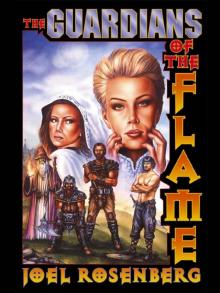 The Sword and the Chain
The Sword and the Chain Not Quite Scaramouche
Not Quite Scaramouche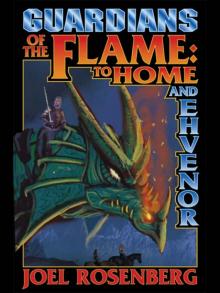 Guardians of The Flame: To Home And Ehvenor (The Guardians of the Flame #06-07)
Guardians of The Flame: To Home And Ehvenor (The Guardians of the Flame #06-07)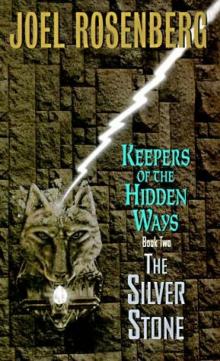 The Silver Stone
The Silver Stone Hero
Hero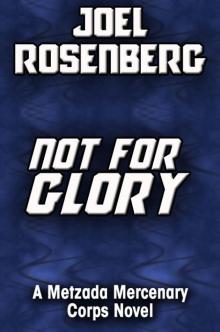 Not For Glory
Not For Glory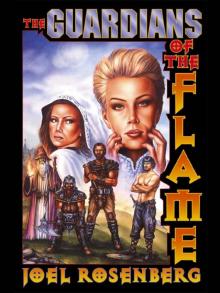 The Sleeping Dragon
The Sleeping Dragon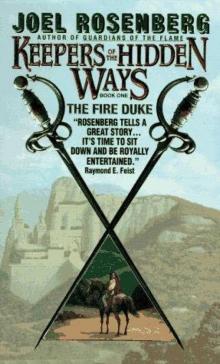 The Fire Duke
The Fire Duke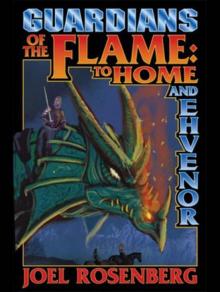 Guardians of The Flame: To Home And Ehvenor (Guardians of the Flame #06-07)
Guardians of The Flame: To Home And Ehvenor (Guardians of the Flame #06-07)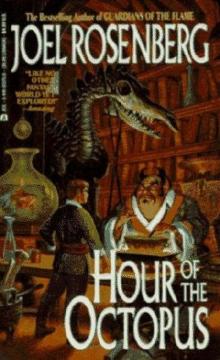 Hour of the Octopus
Hour of the Octopus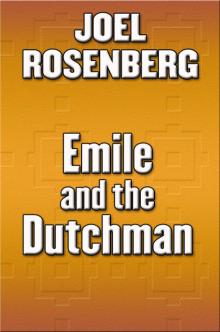 Emile and the Dutchman
Emile and the Dutchman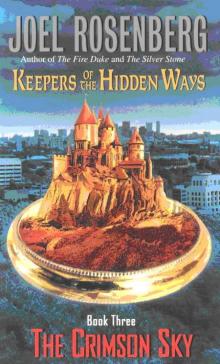 The Crimson Sky
The Crimson Sky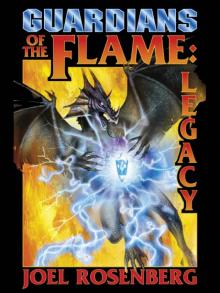 Guardians of the Flame - Legacy
Guardians of the Flame - Legacy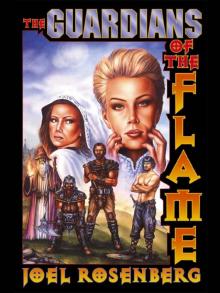 The Silver Crown
The Silver Crown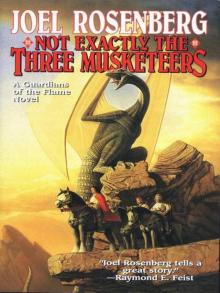 Not Exactly The Three Musketeers
Not Exactly The Three Musketeers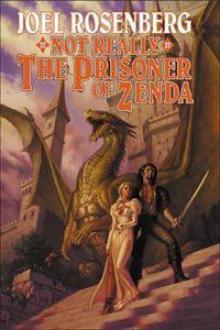 Not Really the Prisoner of Zenda
Not Really the Prisoner of Zenda